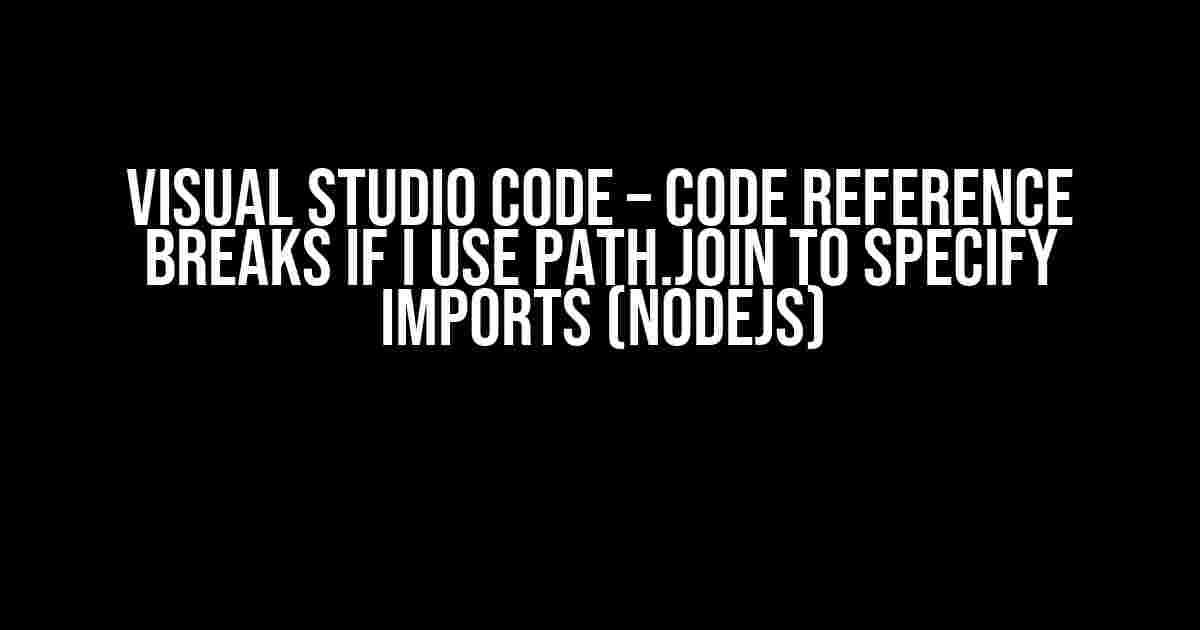Are you tired of struggling with imports in Visual Studio Code? Do you find yourself wondering why your code reference breaks when you use path.join to specify imports in your NodeJS project? Fear not, dear developer! This article is here to guide you through the solution to this frustrating issue.
Understanding the Problem
Before we dive into the solution, let’s take a step back and understand the problem. When you use path.join to specify imports in your NodeJS project, Visual Studio Code’s code reference breaks. This can be frustrating, especially when you’re trying to work on a complex project.
// example of using path.join to specify imports const filePath = path.join(__dirname, '../models/user.js'); import User from filePath;
In the above example, when you use path.join to specify the import path, Visual Studio Code’s code reference breaks. This means that you won’t be able to see the intellisense or code completion for the imported module.
Why Does This Happen?
So, why does Visual Studio Code’s code reference break when you use path.join to specify imports? The reason is that Visual Studio Code uses a different mechanism to resolve imports than NodeJS.
When you use path.join to specify imports, NodeJS resolves the path at runtime. However, Visual Studio Code uses a different algorithm to resolve imports, which is based on the file system. This means that when you use path.join, Visual Studio Code can’t resolve the import correctly, resulting in a broken code reference.
The Solution
Now that we understand the problem, let’s move on to the solution. There are a few ways to solve this issue, and we’ll cover each of them in detail.
Method 1: Using Relative Imports
One way to solve this issue is to use relative imports instead of path.join. Relative imports are resolved by Visual Studio Code’s code reference, so this method works seamlessly.
// example of using relative imports import User from '../models/user.js';
In the above example, we’re using a relative import to specify the import path. This method works because Visual Studio Code can resolve the import correctly.
Method 2: Using Alias
Another way to solve this issue is to use an alias in your tsconfig.json or jsconfig.json file. An alias allows you to map a path to a specific module, making it easier to import modules.
// example of using alias in tsconfig.json
{
"compilerOptions": {
// ... other options ...
"baseUrl": ".",
"paths": {
"@models/*": ["models/*"]
}
}
}
In the above example, we’re using an alias to map the @models/* path to the models/* directory. This allows us to import modules using the alias.
// example of using alias to import module import User from '@models/user.js';
This method works because Visual Studio Code can resolve the alias correctly, allowing you to use code reference and intellisense.
Method 3: Disabling Module Resolution
If you’re using a complex project structure, you might not be able to use relative imports or aliases. In this case, you can disable module resolution in Visual Studio Code.
To disable module resolution, you need to add the following setting to your settings.json file:
{
// ... other settings ...
"javascript.validate.enable": false,
"javascript.validate.module": "none"
}
This setting disables module resolution in Visual Studio Code, allowing you to use path.join to specify imports without breaking the code reference.
Conclusion
In conclusion, using path.join to specify imports in Visual Studio Code can break the code reference. However, by using relative imports, aliases, or disabling module resolution, you can solve this issue and enjoy the benefits of code reference and intellisense in Visual Studio Code.
Remember, when working with NodeJS projects in Visual Studio Code, it’s essential to understand how Visual Studio Code resolves imports and how NodeJS resolves imports at runtime. By understanding these mechanisms, you can avoid common pitfalls and work more efficiently.
Frequently Asked Questions
-
Q: Why does Visual Studio Code’s code reference break when I use path.join to specify imports?
A: Visual Studio Code uses a different mechanism to resolve imports than NodeJS. When you use path.join, NodeJS resolves the path at runtime, but Visual Studio Code can’t resolve the import correctly, resulting in a broken code reference.
-
Q: Can I use relative imports instead of path.join?
A: Yes, you can use relative imports instead of path.join. Relative imports are resolved by Visual Studio Code’s code reference, so this method works seamlessly.
-
Q: How do I disable module resolution in Visual Studio Code?
A: To disable module resolution, you need to add the following setting to your settings.json file: { “javascript.validate.enable”: false, “javascript.validate.module”: “none” }.
Additional Resources
If you’re interested in learning more about Visual Studio Code and NodeJS, here are some additional resources:
- Visual Studio Code NodeJS Tutorial
- NodeJS Modules Documentation
- Visual Studio Code NodeJS Intellisense
| Method | Description |
|---|---|
| Relative Imports | Use relative imports instead of path.join |
| Aliases | Use an alias in your tsconfig.json or jsconfig.json file to map a path to a specific module |
| Disable Module Resolution | Disable module resolution in Visual Studio Code by adding a setting to your settings.json file |
We hope this article has helped you understand the solution to the problem of Visual Studio Code’s code reference breaking when using path.join to specify imports in NodeJS. If you have any further questions, feel free to ask in the comments below!
Happy coding!
Frequently Asked Question
Get the answers to your most pressing questions about using path.join to specify imports in Visual Studio Code for Node.js development.
Why does Visual Studio Code’s code reference break when I use path.join to specify imports in my Node.js project?
This is due to the way Visual Studio Code resolves module imports. When you use path.join to specify imports, the IDE has trouble resolving the absolute paths, leading to broken code references. Don’t worry, there’s a fix!
How do I fix the broken code references in Visual Studio Code when using path.join for imports?
To fix this issue, you can update your tsconfig.json file by adding the “moduleResolution” option and setting it to “node”. This tells Visual Studio Code to use Node.js’ module resolution algorithm, which should fix the broken code references.
What is the difference between using path.join and requiring modules with relative paths in Node.js?
When you use path.join, you’re specifying an absolute path, whereas requiring modules with relative paths uses Node.js’ built-in module resolution algorithm. The latter is generally recommended, as it allows Node.js to handle the module resolutions for you.
Can I use path.join with TypeScript in Visual Studio Code?
Yes, you can use path.join with TypeScript in Visual Studio Code. However, you’ll need to ensure that your tsconfig.json file is correctly configured to handle module imports with absolute paths.
Are there any best practices for using path.join with imports in Node.js projects?
Yes, it’s recommended to avoid using path.join for imports whenever possible. Instead, use relative paths or require modules using Node.js’ built-in module resolution algorithm. This makes your code more maintainable and easier to understand.


